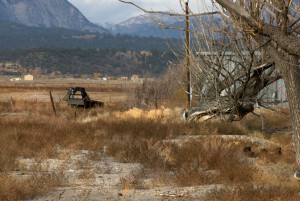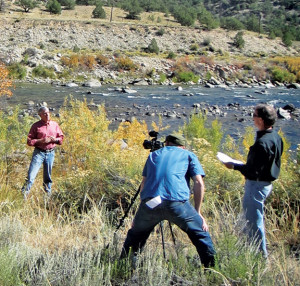By Polly Oberosler
My paternal grandfather, John Sherman Moses Cranor, born in 1864, was a sixth-generation American and worked at whatever he could to make a living, as did most during his time. In doing so, he inadvertently schooled his five children in lessons of resourcefulness, honesty and hard work that they soon needed. My grandmother died in the 1918 flu epidemic, and they were virtually on their own quite prematurely.
Those young people were the movers and shakers of a generation of Americans unparalleled in history. They came from the era of the horse and buggy, yet crossed the lines and adapted to the most accelerated portion of industrial expansion. They absorbed incredible knowledge and savvy about anything or any piece of equipment as it was manufactured and put to use in the fields, on the dam projects or on the highways.
With their passing, I have a sense that something is now totally gone that can never be replaced or duplicated. My father, along with his brothers and sisters, exemplified the meaning of “good stock.” They were strong, honest, considerate and steadfast in their beliefs of fairness and family. They were very much the real living and breathing pioneers that Louis L’Amour characterized as the Sackett family in his books. Lean, square-shouldered and ruggedly handsome, they represented all that the West was fabled for.
The three boys of my grandfather’s family built bridges, dams, cabins and homes. They trapped, hunted, farmed, welded and logged. While ranching they rode, roped, fenced and coaxed water to some far-away dry ground they hoped to someday grow a crop of hay on. Two of them served in World War II while the other stayed home to watch over their interests. My two aunts milked cows, tended small livestock, patched trousers, drove tractors and had dinner on the table at day’s end, even in grade school. Male or female, all of them could throw together a dinner and saddle a horse, pound a nail or start a tractor.
My dad’s oldest sister Ruby was the only one of them to receive anything beyond normal school education, becoming a teacher after graduating from Western State College. In fact, she taught in the one-room Paragon School that is now preserved at the Pioneer Museum in Gunnison, Colorado. The boys of the family received limited formal schooling; their education was hands-on, coupled with astute observation on a daily basis their lives through. As young men they were thrown headlong into the technological revolution.
I realize now just how self-taught they were when I remember my dad helping me with various writing assignments. He always knew just how to phrase a sentence or to spell a word I was wrestling with, or the best way to structure an essay from beginning to end. I think of my Uncle John and Aunt Phoebe poring over the crossword puzzles in the Sunday paper and how amazed I was that they knew so many of the answers on that huge, complicated grid. My dad’s brother Sherman could more than likely tell you exactly how many logs you would need for any size building right off the top of his head. Aunt Edna could probably come to within a few bushels of the actual content held in one of her corn silos as easily as she could tell you the number of teaspoons of salt in a biscuit recipe.
Between my cousins, my siblings and me, we have a great deal of the virtues, both in stature and personality, that tell of that lineage. We all have an understanding of life, savvy when it comes to the environment that surrounds us, and the shoulders to hold up the world if need be. We are, however, molded by our time, as were they, and we may never be forced to become what they were.
I can’t help believing that in many ways the five of them and their lifestyles were so incredibly unique that there will never be a true understanding of all they knew and the things they accomplished. Each of their spouses, of course, knew of their abilities, and they too contributed to each of ours, the sons and daughters who only hope to carry on as we were left.
Polly grew up in the Gunnison Valley and writes of mountain and ranch life, wilderness experiences and the more obscure historical events of the area. She and her husband volunteer every summer with the U.S. Forest Service in the West Elk Wilderness where she tries to stay in the saddle, because falling hurts too much these days.


